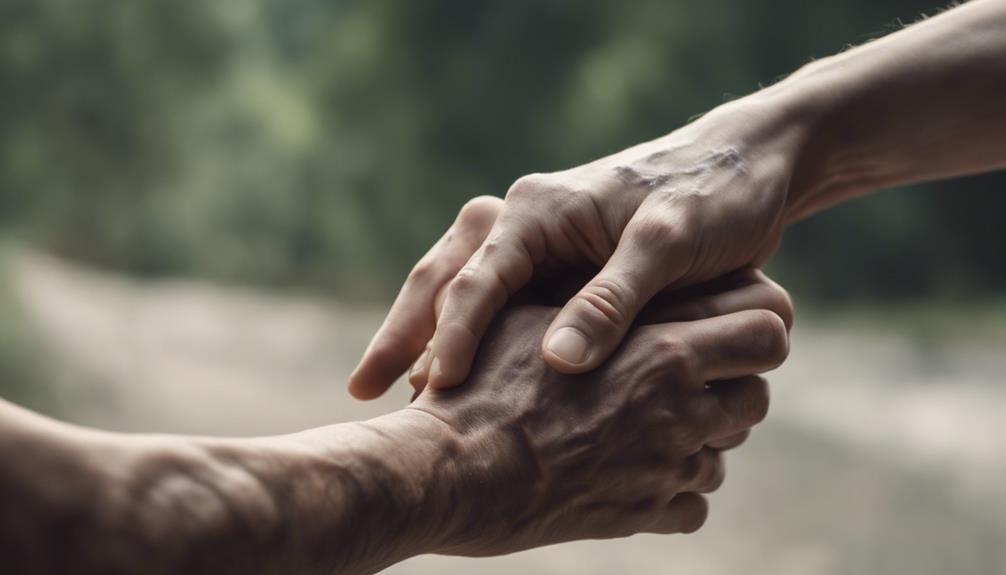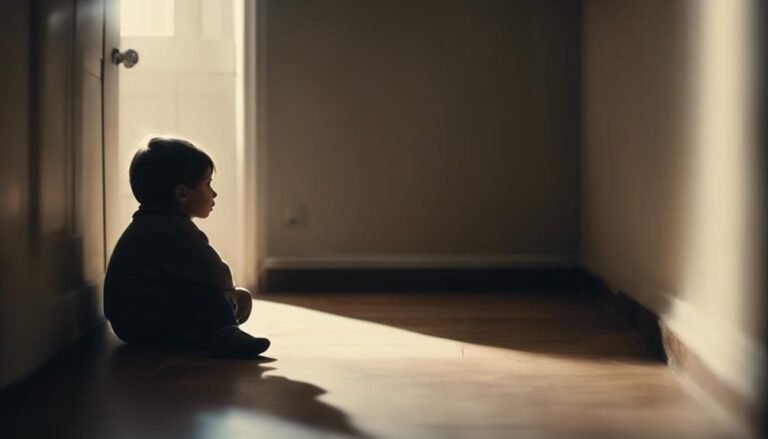Finding the path to healing after abuse might feel daunting, but you can find strength and rebuild your life with proper support. Focus on therapy, support groups, and self-care to start your journey. Remember, healing takes time and patience, so be gentle with yourself as you move forward. Family support is essential, so consider seeking counseling together. You have the power to overcome this.
Key Takeaways
- Seek therapy and support groups for healing and emotional stability.
- Practice self-care, mindfulness, and engage in creative outlets.
- Build trust, set boundaries, and communicate openly in relationships.
- Address cognitive distortions through therapy for self-perception challenges.
- Utilize family support, counseling, and resources for collective healing.
Long-Term Psychological Effects on Abuse Survivors
Experiencing abuse can have lasting effects on survivors’ mental health, leading to conditions such as PTSD, depression, anxiety, and low self-esteem. Survivors often find themselves grappling with long-term psychological effects that stem from the trauma they endured.
The impact of abuse can extend far beyond the initial experience, affecting various aspects of survivors’ lives. Survivors may struggle with trust, intimacy issues, and difficulty forming healthy relationships due to the trauma they’ve faced. This can result in feelings of isolation and a sense of detachment from others.
Chronic stress from abuse can also take a toll on physical health, increasing the risk of developing chronic diseases. Furthermore, the emotional burden of abuse can lead survivors to experience feelings of guilt, shame, and self-blame, which significantly impact their mental well-being.
It’s important for survivors to seek therapy and support groups to address and heal from these long-term psychological effects, fostering a journey towards recovery and empowerment.
Emotional Impact on Victims and Families
As a survivor of abuse, your emotional trauma is valid and deserves recognition.
Your healing journey can be supported by your family’s understanding and compassion.
Together, you can navigate the path to healing and recovery, fostering stronger bonds and a healthier future.
Victim’s Emotional Trauma
Healing from the emotional trauma caused by abuse can be a challenging journey for both victims and their families. The impact of abuse can manifest in various ways, leading to conditions such as depression, anxiety, PTSD, and low self-esteem. Victims often struggle with overwhelming feelings of guilt, shame, fear, and isolation as a result of the trauma they’ve endured.
In the case of children who’ve been exposed to abuse, the effects can be even more profound, resulting in behavioral problems, academic difficulties, and long-term emotional scars.
To address this emotional trauma effectively, seeking therapy, joining support groups, and practicing self-care are essential steps in the healing process. It’s important for survivors to understand that healing takes time and patience.
Additionally, family members of abuse victims may also require counseling and education on how to provide the necessary support to their loved ones during this challenging time. Remember, you aren’t alone in this journey towards healing; there’s support available to help you navigate through the emotional aftermath of abuse.
Family Support Crucial
For survivors of abuse, the presence of robust family support can greatly impact their journey towards healing and emotional stability. When dealing with the aftermath of abuse, particularly in a domestic or abusive relationship, victims and their families often experience profound emotional impacts such as trauma, fear, and anxiety. In these challenging times, having a strong support system within the family can make a significant difference in the recovery process.
The effects of abuse aren’t limited to the individual survivor; they can extend to the entire family unit, creating a need for collective healing and support. Seeking professional help and fostering open communication within the family are vital steps in addressing the challenges that arise after experiencing abuse.
Healing Together Possible
In maneuvering the emotional impact of abuse on both victims and families, finding ways to heal together is an essential step towards recovery and emotional well-being.
The journey of healing together is possible, offering a path towards overcoming the profound effects of abuse. Victims often grapple with feelings of fear, shame, and isolation, but with the right support and therapy, healing becomes achievable.
Families impacted by abuse also face emotional turmoil, yet through therapy, open communication, and support groups, they can navigate the aftermath together.
Counseling, self-care practices, and community resources play pivotal roles in the healing process for survivors of abuse and their loved ones.
Behavioral Changes in Survivors

Survivors of abuse often undergo significant behavioral changes as a result of their traumatic experiences. These changes can manifest in various ways, such as increased anxiety, depression, or symptoms of post-traumatic stress disorder (PTSD).
Survivors may find themselves constantly on edge, hypervigilant to potential threats, or actively avoiding triggers that remind them of their trauma. Trusting others can become challenging, leading to difficulties in forming or maintaining relationships.
Additionally, survivors may notice shifts in their sleep patterns, appetite, or substance use as coping mechanisms. Some individuals might display symptoms of dissociation, engage in self-harm, or experience suicidal thoughts.
Feelings of guilt, shame, and low self-esteem are common emotional responses following abuse, further impacting behavioral patterns. Understanding these behavioral changes is essential in supporting survivors on their healing journey.
Cognitive Challenges Post-Abuse
You may find that after experiencing abuse, your memory and cognitive functions mightn’t be as sharp as they once were.
Your brain’s processing of information could be affected, impacting your emotions and behaviors.
It’s important to acknowledge these cognitive challenges and seek support to improve your daily functioning and overall well-being.
Memory and Trauma
Experiencing abuse can lead to significant cognitive challenges post-trauma, impacting memory, concentration, and decision-making abilities. The pioneering work of Bessel van der Kolk in ‘The Body Keeps the Score’ sheds light on how trauma can deeply affect memory and cognitive functions. Survivors of abuse may find themselves grappling with difficulties in recalling information, maintaining focus, and making decisions due to the enduring impact of trauma on the brain.
Trauma-induced cognitive impairments can manifest as forgetfulness, confusion, and disorientation, making it challenging to navigate daily tasks and responsibilities. Learning new information, following instructions, and completing tasks efficiently may become arduous tasks for survivors.
It’s crucial to recognize these cognitive challenges and seek appropriate support, such as therapy, counseling, and cognitive rehabilitation, to aid in regaining cognitive function and mental clarity. By acknowledging and addressing these obstacles, survivors can take steps towards healing and reclaiming their cognitive abilities.
Cognitive Distortions
Cognitive distortions, stemming from negative thought patterns, can frequently arise in individuals who’ve endured abuse, impacting their perception of self and their experiences. Survivors may find themselves trapped in harmful beliefs such as self-blame, minimizing the severity of the abuse, or feeling responsible for their abuser’s actions. Recognizing these distortions is an essential step towards healing and reclaiming self-worth.
It is crucial for survivors to challenge these distorted thoughts through therapy, support groups, and self-help resources. By acknowledging and reframing these damaging patterns, individuals can begin to rebuild their self-esteem and cultivate healthier beliefs about themselves and their experiences.
Healing from abuse involves not only addressing the physical and emotional scars but also unraveling the cognitive distortions that have taken root in the survivor’s mind.
Social Relationships After Abuse

Managing social relationships after experiencing abuse can be a challenging but essential part of the healing process. When coming out of situations like domestic violence, it’s important to rebuild healthy connections.
The book offers guidance on maneuvering through various types of relationships post-abuse, including friendships, family dynamics, and romantic relationships. It provides strategies for setting boundaries, communicating effectively, and fostering trust in relationships. By empowering survivors to create a supportive social network, the resource aims to promote healing and growth.
Remember, self-care and self-compassion are essential during this journey. Seeking professional help when needed is a sign of strength and a step towards healing.
Embrace the process of healing in your social relationships, and know that it’s okay to take your time and prioritize your well-being as you navigate this intricate path towards a healthier and more fulfilling social life.
Coping Mechanisms for Survivors
Starting on the journey of healing after abuse involves developing essential coping mechanisms to address the emotional and psychological aftermath of trauma. Coping mechanisms play a pivotal role in helping survivors navigate the complex emotions and challenges that may arise.
Therapy, support groups, and self-care practices are valuable tools for managing the impact of abuse on your well-being. Engaging in creative outlets, physical activities, and mindfulness practices can also aid in your healing journey.
Setting boundaries and seeking professional help when needed are important steps in promoting your mental and emotional health.
These coping mechanisms are designed to assist you in managing triggers, processing difficult emotions, rebuilding self-esteem, and regaining a sense of safety and empowerment.
Healing Strategies for Families

How can families begin the process of healing and rebuilding trust after experiencing abuse?
Domestic abuse can have a profound impact on families, affecting trust, communication, and overall well-being. To navigate the path towards healing, it’s essential for families to seek support and implement strategies aimed at fostering resilience and rebuilding healthy relationships. Victims of crime within the family unit often require specialized care and attention to address the trauma inflicted by abuse.
Healing strategies for families affected by domestic abuse involve seeking therapy, counseling, and support groups tailored to their needs. These resources can provide valuable guidance on rebuilding trust, establishing healthy boundaries, and promoting open communication.
Addressing the impact of abuse on children is also essential, as creating a safe and supportive environment is paramount for their well-being.
Support Systems for Recovery
In your journey toward healing after abuse, having strong support systems in place is essential for your recovery and well-being.
The National Domestic Violence Hotline is a valuable resource that offers hope, providing free, confidential, and 24/7 support for identifying abuse, safety planning, and connecting you with local resources.
Additionally, there are various literature resources available to aid in trauma recovery, self-compassion, and preventing further abuse. Practical suggestions from books on healing strategies, recovery practices, and personal safety techniques can empower you on your path to healing.
Support literature tailored for LGBTQ+ individuals, partners, spouses, and families affected by abuse also exists, offering specialized guidance and understanding.
Engaging in mindfulness, yoga, and self-exploration activities can further support your recovery journey by promoting self-awareness and inner peace.
Frequently Asked Questions
What Are the Long Term Effects of Emotional Abuse?
Emotional abuse can deeply affect mental health, leading to conditions like anxiety and PTSD. Survivors may struggle with forming healthy relationships, battling low self-esteem. Seeking therapy and support groups are crucial for healing.
Conclusion
Congratulations, you made it through the storm! Now it’s time to commence on the journey of healing after abuse.
Remember, healing isn’t a linear process, but a rollercoaster of emotions and challenges. So buckle up, strap in, and hold on tight as you navigate this bumpy ride towards self-discovery and growth.
You’re strong, resilient, and deserving of love and healing. Keep moving forward, one step at a time. You got this!







